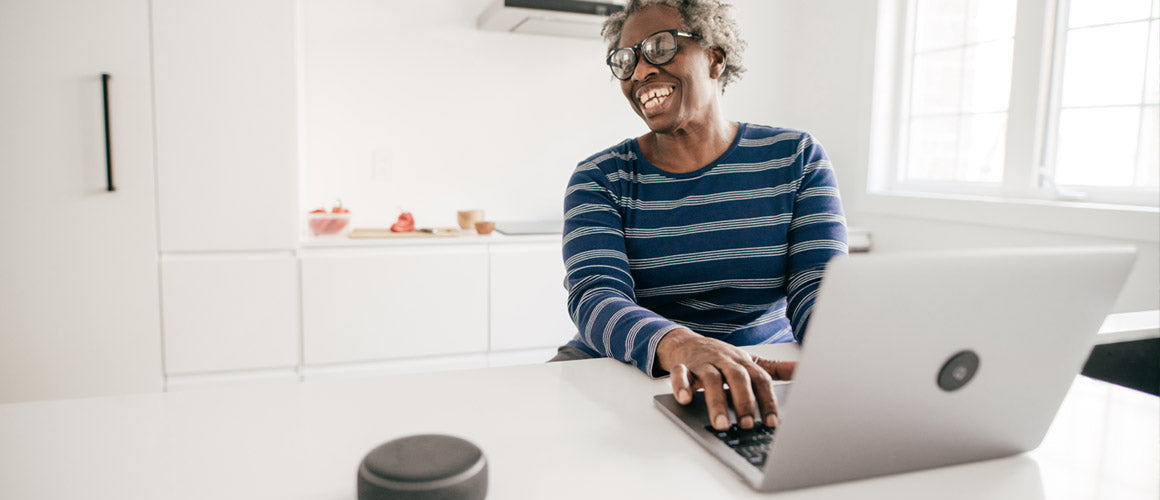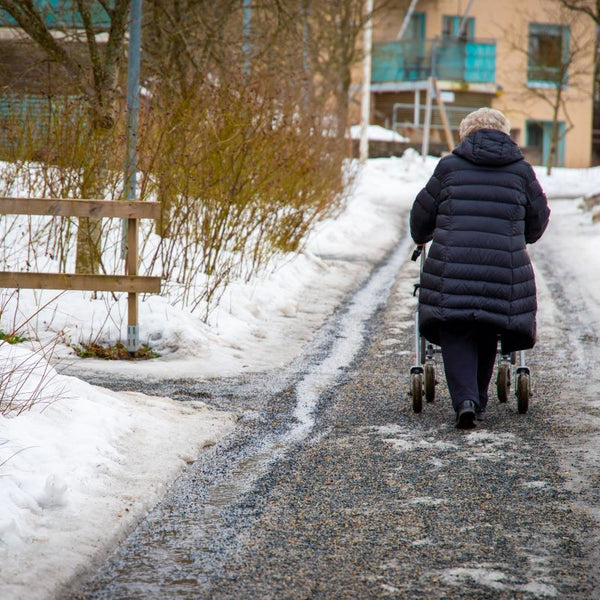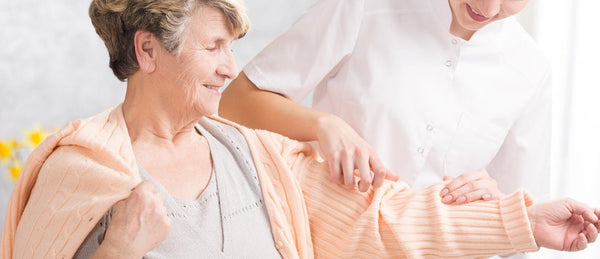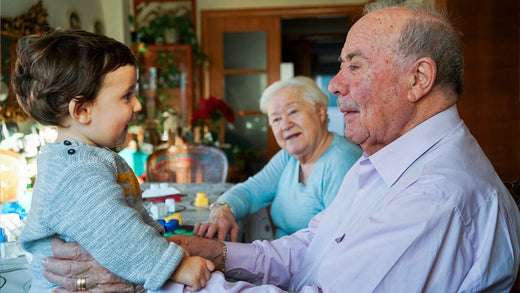Reading time: 7 minutes
As technology advances, more people are using home monitoring systems as part of a care solution for their elderly parents.
Many see remote monitoring as a cost-effective alternative to more expensive in-person care. With substantial costs associated with care homes, remote monitoring can also delay the need to consider a nursing home by keeping loved ones safer at home for longer.
In this guide, we discuss the use of home monitoring technologies and how to evaluate the best home monitoring systems currently available in the UK.
Table of contents
- Can technology be used to care for parents remotely?
- How can you keep an eye on an elderly parent remotely?
- How do home sensors and monitors work?
- How do I choose the best home monitoring system?
- Where can I get a demonstration of elderly home monitors?
- Frequently asked questions about elderly home monitoring
Can technology be used to care for parents remotely?
Most people want to remain in their own homes as they age. After all, it is where our memories are made and a sign of our independence.
The challenge many families face is providing the level of support loved ones need to remain independent and safe, without resorting to expensive homecare.
The Internet of Things (IOT), voice-activated technology such as Amazon’s Alexa and Apple’s fall detection personal alarm watch feature have all helped bring the possibilities of elderly home monitoring into families’ conversations about eldercare.

These relatively new technologies can support older adults to remain independent. In fact, preventative solutions can even highlight changes in routine or health before a health condition or issue becomes more serious. This can prolong independence and delay the need for in-person care.
A study in 2020 found that older adults, family caregivers and nurses favoured ambient sensors (those that monitor changes in health status, detect falls or monitor daily activities) over wearable devices such as personal alarms.[1]
Most older adults, family caregivers and nurses said in-home sensors (ambient and wearable) improved home care and quality of life, prevented domestic accidents and reduced family stress.[1]
How can you keep an eye on an elderly parent remotely?
People with carer responsibilities are often juggling multiple commitments. Busy careers, stresses of work, relationships and young children can mean family carers are not always able to spend as much time as they would like with elderly loved ones.
They may feel guilty and worry what may happen when their parents are alone. Many families do not live close to their parents so remote monitoring provides them with peace of mind and the information they need to manage their parents’ care needs.
Monitoring systems use sensors to monitor movement, behaviour, and changes in the home environment, such as temperature. Artificial Intelligence (AI), sometimes referred to as machine learning, will analyse the data collected. Depending on the monitoring system, the insights from this data will be available to view in an app or report.
These insights can alert you to issues that need your attention.
The sensors will be connected to the internet. This will either be through a mobile network with a SIM card built into the equipment or through a broadband Wi-Fi network in the home.
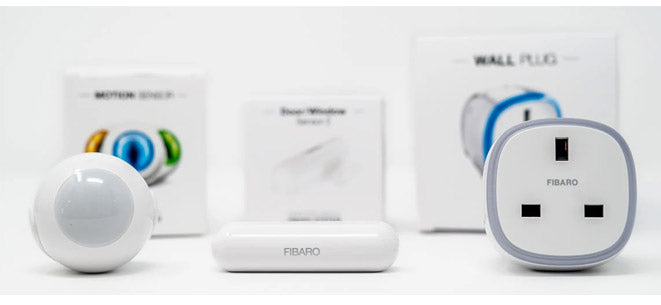
What can home sensors detect?
Home sensors for the elderly may detect:
- The opening and closing of doors to track movement.
- Changes in sleep patterns.
- The number of trips to the bathroom.
- Use of domestic appliances such as a kettle or microwave.
- The temperature in the property.
Some systems will be fully automated. Others may include 24-hour monitoring of emergencies by a specialist monitoring centre.
The most comprehensive solutions will also include a way for the elderly person to get help in an emergency such as a fall. This may be in the form of a panic button or personal alarm pendant that connects them to a someone they can speak to at the 24-hour monitoring centre.
I check the family app at least once a week and what has surprised me most is just how much habit there is to Ann’s daily routine, so actually it is pretty easy to see when something is not quite right.
Elizabeth, Taking Care Safe Home Alert customer
Read more

Advice to help you talk about care options

Talking about elderly care early improves health and wellbeing. That's why we're encouraging family carers to #HaveTheTalk by offering personalised guidance to help you have an open and honest discussion about care options.
How home sensors and monitors work
Passive sensors are setup around the home. These are unobtrusive and do not require any interaction to work. As the person goes about their daily routine, they automatically collect data and send it to a central platform where it is analysed.
As an example, someone may normally get up between 8am – 9am and make a cup of tea. If this routine changes, it may indicate they are unwell, feeling lethargic or that something more serious needs immediate attention.
As an example, a home monitoring system may consist of:
- Door sensors to detect when the person gets up in the morning and moves out of the bedroom.
- Smart plug sensors to detect when the kettle is turned on and at what time.
- Sensors may also detect how frequently the microwave is used and how often the fridge door has been opened.
- Temperature sensors to detect unusually high or low temperatures, for example if a window or door has been left open, or if the central heating has been left on.
- Motion sensors can detect the number of trips to the bathroom during the night, or if the person has gone into the bathroom and not returned.
- A front door sensor can detect if access to the property has been left open.
The data from these sensors could show the person is not eating or drinking as much as they previously have been, or changes in night-time behaviour.
What surprised me most at first was mama’s irregular sleeping pattern and high level of night-time activity: my sister and I had no idea that she was out of bed and wandering around her house nearly every night. It explained why she is often so tired in the morning and during the day.
James, Taking Care Safe Home Alert customer
Read more
Some solutions may include wearable monitors to track things such as heart rate or blood pressure. Whilst these may sound great, they do rely on the person to wear them and will need charging regularly.

How to choose the best home monitoring system
When choosing an elderly monitoring system, you should consider 8 main points:
- How much does it cost? Check the monthly fees and setup charges, and whether there are extra costs to consider (such as a data plan if it does not rely on broadband).
- Are there contractual obligations? You may be tied into a long-term contract or higher costs after a discounted period.
- Can you try before you buy? A home demonstration or money back guarantee can provide reassurance that you are making the right decision and not committing to an expensive solution that may not be suitable.
- Is the system non-intrusive? Your loved one will not want to feel like they are being watched. The use of cameras and microphones will make them feel like they are being spied on.
- How easy is it to setup or install? The sensors may need to be configured to connect to a hub via a Wi-Fi internet connection. Some systems will include a setup and installation service, which is convenient and hassle-free.
- Is it reliable and what happens if something stops working? Without a warranty or installation service, you may be left to reconfigure the equipment yourself, which may be inconvenient if you do not live nearby.
- How reputable is the provider of the monitoring service and what is their background? You want to ensure the best level of care for your elderly loved one. Knowing there is 24-hour monitoring from a specialist provider of elderly personal alarms will provide more peace of mind than a solution that does not include emergency monitoring.
- What happens if your loved one has an emergency? Home monitoring is great but if your loved one has a fall when no-one is around, then you want help to quickly reach them.
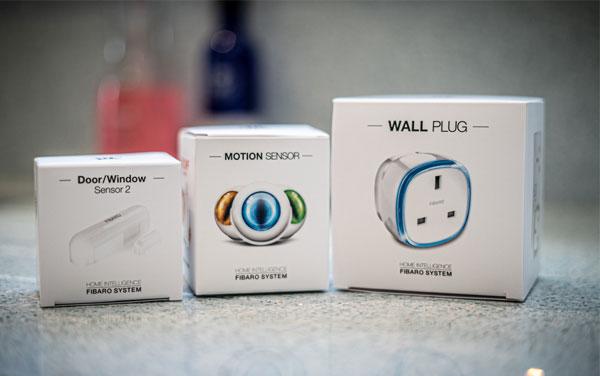
You should also consider if the features of the home monitoring solution meet your care needs. Families have three main concerns when providing care support for elderly loved ones. You should assess if the elderly monitoring system addresses these concerns:
- Has something gone wrong that requires immediate action? If the system sends automatic alerts to a 24-hour monitoring centre, you can be reassured that someone will always respond, any time of the night or day, even when you may be asleep or busy at work
- Is something changing that should be looked at? You may not notice gradual changes in your loved one's routine that suggest a health issue or concern. A system that will highlight these changes will help you proactively manage your loved one’s health.
- Is my loved one OK when I'm not with them? Many home monitoring systems will only detect changes in routine. If there is an emergency, such as a fall, or your loved is in distress, you want them to have a simple way to call for help.
Where can I get a demonstration of elderly home monitors?
It is important that your elderly loved one accepts the need for home sensors and feels comfortable with the package you choose.
Some solutions, like Taking Care Safe Home Alert, offer a free no-obligation home demonstration. This gives you the opportunity to see the equipment in action, ask any questions you may have and involve your elderly loved one in the decision-making process.
Book an elderly home monitoring demo
Taking Care offer a no-obligation in-home demonstration of Safe Home Alert. Book a demo at a convenient time to suit you and an Independent Living Advisor will show you the sensors, explain how it works and answer any questions you may have.
Frequently asked questions about monitoring systems for elderly
How can I help my elderly parent remotely or care for elderly parents from a long distance?
A smart home monitoring solution is a good way of keeping your parents safe and healthy, whilst maintaining their independence.
A personal alarm can also be invaluable, and potentially life-saving if they have an accident when they are on their own. With a personal alarm, they can call for help without using a mobile phone.
In addition, you can consider other practical steps such as arranging carer visits, sharing responsibilities with family and friends, offering support to manage finances and have an emergency plan should the worst happen.
Are elderly monitoring systems expensive?
Prices vary depending on the equipment and monitoring included. Taking Care Safe Home represents good value on the market, with the monthly subscription recently reduced to £39.99 a month (excluding VAT) with a 30-day risk-free home trial. In comparison, home help care can cost approximately £960 a month and live-in care £4,500 a month. You can compare care solution costs online.
Does home monitoring of the elderly use cameras?
No, as these would be considered intrusive, and most people would feel uneasy knowing their movements and behaviour are under surveillance by family members. Whilst a home security system includes cameras, elderly alert systems do not.
What is the best camera to monitor the elderly?
If you are considering video monitoring of elderly parents, then an indoor CCTV-type security camera would be most suitable. Monitoring cameras can include tilt and movement features and motion detection. They will usually be IP compatible and connect to WI-FI. However, your loved one will probably be uncomfortable with that level of monitoring! It would also rely on you being able to monitor the video feed and responding accordingly. A home monitoring or telecare system will be much more suitable.
Which is the best personal tracking device for the elderly?
Most home monitoring solutions do not track the location of the elderly person and are limited to working within the home. There are GPS tracking devices available though, for example dementia tracker pendants and GPS personal alarms that work anywhere in the UK.
Is home monitoring an alternative to care home?
Home monitoring can delay the need to consider a care home. It can even play an important preventative role in reducing accidents and injuries around the home that can lead to the level of support provided by in-person care. A care home or nursing home can meet different care requirements though, for example later stage dementia care.
Is Amazon’s Alexa a good way to monitor elderly parents?
Alexa is great for voice activated commands and calling. If your parent is comfortable with technology then you can use it for voice and video calls However, it lacks functionality to detect changes in behaviour or conditions around the home, like the home monitoring solutions described in this article.
What is Amazon Alexa's new elder care service?
Alexa Together is paid for service, currently only available in the USA, that allows users to call remote agents for help in an emergency. Fall detection can also be included with sensors from Assistive Technology Service (ATS) and Vayyar. However, the fall detection technology only works in the room covered by the sensor. In comparison a personal fall alarm will work in the home and garden a GPS tracker for seniors with fall detection will work anywhere in the UK.
Book an elderly home monitoring demo
Taking Care offer a no-obligation in-home demonstration of Safe Home Alert. Book a demo at a convenient time to suit you and an Independent Living Advisor will show you the sensors, explain how it works and answer any questions you may have.
1. Frontiers in Public Health, "Evaluation of 1-Year in-Home Monitoring Technology by Home-Dwelling Older Adults, Family Caregivers, and Nurses" https://www.frontiersin.org/articles/10.3389/fpubh.2020.518957/full
